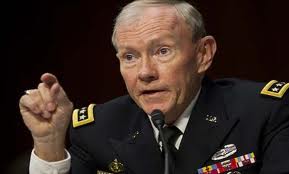
Washington, May 12: A course for US military officers has been teaching that America's enemy is Islam in general, not just terrorists, and suggesting that the country might ultimately have to obliterate the Islamic holy cities of Mecca and Medina without regard for civilian deaths, following World War II precedents of the nuclear attack on Hiroshima or the allied firebombing of Dresden.
The Pentagon suspended the course in late April when a student objected to the material . The FBI also changed some agent training last year after discovering that it, too, was critical of Islam. The teaching in military course was counter to repeated assertions by US officials over the past decade that America is at war against Islamic extremists , not the religion itself.
"They hate everything you stand for and will never coexist with you, unless you submit ," the instructor, army Lt Col Matthew Dooley, said in a presentation last July for the course at Joint Forces Staff College in Norfolk, Virginia.
The college, for professional military members, teaches midlevel officers and government civilians on subjects related to planning and executing war. Dooley also presumed, for the purposes of his theoretical war plan, that the Geneva Conventions that set standards of armed conflict are "no longer relevant" . He adds: "This would leave open the option once again of taking war to a civilian population wherever necessary (precedents of Dresden, Tokyo , Hiroshima, Nagasaki being applicable... )".
His war plan suggests possible outcomes such as "Saudi Arabia threatened with starvation ... Islam reduced to cult status" and the Muslim holy cities of Mecca and Medina in Saudi Arabia "destroyed" .
A copy of the presentation was obtained and posted online by Wired.com's Danger Room blog. The college did not respond to The Associated Press' requests for copies of the documents, but a Pentagon spokesman authenticated the documents. Dooley still works for the college, but is no longer teaching, Joint Chiefs Chairman Gen Martin Dempsey said. Dooley refused to comment, saying "Can't talk to you, sir," and hanging up when reached by telephone at his office on Thursday. A summary of Dooley's military service record provided by Army Human Resources Command at Fort Knox, Kentucky, shows that he was commissioned as a second lieutenant upon graduation from the US Military Academy in May 1994. He has served overseas tours in Germany, Bosnia, Kuwait and Iraq. He has numerous awards including a Bronze Star Medal, the fourth-highest military award for bravery, or meritorious service.
In what he termed a model for a campaign to force a transformation of Islam, Dooley called for "a direct ideological and philosophical confrontation with Islam" , with the presumption that Islam is an ideology. He asserted that Islam has already declared war on the West, and the US specifically. "It is therefore illogical" to continue with the current US strategy, which Dooley said presumes there is a way of finding common ground with Islamic religious leaders without "waging near 'total war,'" he wrote.





Comments
Add new comment